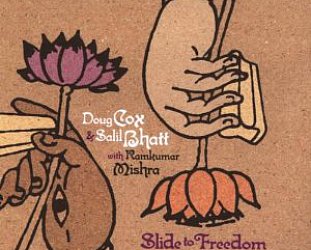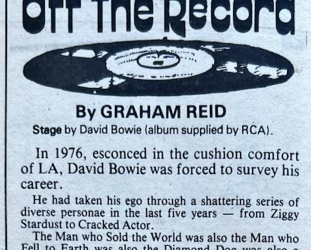Graham Reid | | 6 min read

Any clear-eyed look back on 2011 would say it wasn't a great one for electric guitars. Classic, mainstream rock albums were few and far between, and the singles charts – often a bridge between guitar pop and indie.rock – have long been the domain of r'n'b/hip-hop (“featuring Bulldog”).
In what might loosely be called “rock culture”, rock music seems firmly on the margins of the mainstream.
So what have those who believe in rock done? As others did with jazz and reggae previously, they have had it repackaged and re-presented because this music has a long past to explore and – if you prefer the record industry jargon – exploit.
The past year was good one for re-issues and living in the past.
The old joke, “Why do so many prefer to live in the past?” (Answer: “It was cheaper back then”) is also not quite so funny these days. The past now comes with a bonus disc, booklet, often a DVD and some memorabilia.
This version of past – chopped and channelled, given digital cosmetic surgery and repackaged with essays an photos to explain it to old and new fans alike – can come with a high entry price in many instances. But that doesn't mean it is like going back to the same playground you enjoyed as a kid to find they've changed your favourite rides into more shiny and sophisticated ones. The rides are the same, but the new ones added are just as thrilling.
Because anniversaries are always good for rock's business, the 20th birthday of Nirvana's Nevermind allowed for a big re-presentation, and that was one of the more thrilling rides.
Not only does the original album still stand on its own merits of blazing rock with pop structures (bassist Krist Novoselic once said it “could have come out in the 70s or 80s”) but the reissue came with B-sides and, even better, their rehearsals and early studio sessions where you can hear just what a possessed man Kurt Cobain was. You get the clear impression he simply had to sing these songs. They were life and death to him and, as we discovered, that proved to be literally true.
That was an essential reissue in 2011 – as was the expanded U2 album Achtung Baby.
When they went to Germany to start working on their next move, U2 had painted themselves into a corner as a stadium band with too few songs but plenty of arm-waving heroics. With producers Brian Eno and Daniel Lanois, they engaged with techno and guitar static and reinvented themselves as an edgy, probing and much darker band. Achtung Baby of '91 (and its follow-up Zooropa two year later cut from the same metal plate) was the most remarkable, courageous and exciting album of their career – and indeed among that in any career in rock.
 The expanded reissue came B-sides, remixes and covers, but if you are
a fan, then locate the deluxe edition with six CDs (the original
album, Zooropa, dozens of remixes etc) and four DVDs. It is
exceptional and you can hear the coordinates of rock shift before
your ears.
The expanded reissue came B-sides, remixes and covers, but if you are
a fan, then locate the deluxe edition with six CDs (the original
album, Zooropa, dozens of remixes etc) and four DVDs. It is
exceptional and you can hear the coordinates of rock shift before
your ears.
Another who changed the way people though about rock was Jimi Hendrix and his reissue programme hit a peak with the four-CD set Jimi Hendrix Experience: Winterland recorded over three nights at the famous venue in San Francisco.
Hendrix has been much reissued (only the previous year was the similarly-sized career spanning box West Coast Seattle Boy) and you could argue, who needs four versions of Purple Haze and three of Hey Joe, Foxey Lady and Red House?
Well, if you like guitar rock, then you do. These days bands are so locked into the set list and requirements of the computer programed light show there's no room for spontaneity (despite what they might tell you). But back in '68 Hendrix, drummer Mitch Mitchell and bassist Noel Redding just took to the stage and played. Every night was different, every version of every song took off on a tangent.
This too is why people live in the past. It was more unpredictable and exciting then.
Although at the other end of the spectrum was the reissue of an album which never actually appeared at the time, if you can follow that. The Beach Boys' SMiLE was the great lost album of rock when Brian Wilson (and more specifically his record company) abandoned it in '68 with only the beautiful, complex and seductively sublime singles Good Vibrations and Heroes and Villains hinting at its greatness.
But in 2011, some 45 years later, the album -- painstakingly reconstructed from the hundreds of hour of studio sessions – finally appeared and again, as with the U2 set, if you were ever a fan, are curious about Wilson's studio technique or just want to hear genius at work then aim for the five CD box set editions with dozens of rehearsals punctuated by his exacting methods and unexpected humor. Otherwise, the double disc should be on any shelf. It ain't guitar rock, but it is a psychedelic masterpiece.
And speaking of drugs . . .
There as no anniversary, but the well annotated reissue of the whole Pink Floyd catalogue threw up some real gems,and they weren't the obvious ones (Dark Side of the Moon, Wish You Were Here, The Wall) either. Their exploratory, cosmic rock on the albums which came before Dark Side reminded you they weren't always the glum, self-important and often boring band they became. Those early album are well worth checking out.
As were the reissues of the Suede catalogue (each with an extra disc of B-sides, rare material and rarities) where their first three albums – the self-titled debut of 93, Dog Man Star and Coming Up – delivered confident sexually ambiguous swagger, dark drug-induced haziness and exciting guitar textures.
Suede were also more subtle than many perhaps recognised at the time, not something you could say about Cold Chisel whose catalogue (with extra material) was also reissued. Chisel delivered literate, heart-on-sleeve and often raw-nerve rock – with guitars! – and their albums showed what a formidable and important band they were, and remain so on the evidence of their recent New Zealand shows.
That's not something you might say about Paul McCartney, but the reissue of his McCartney I and McCartney II albums (from 1970 and 80 respectively) were instructive in their own ways, especially McCartney II where the bonus material included his weird experimental work which went past just about everyone at the time. If you'd always dismissed him as a lightweight pop craftsman, McCartney II is proof of what the collision of marijuana, money, musical curiosity and having your own studio allows you to do. Just get a little weird.
At the other end of the spectrum was The Rolling Stones and the reissue of Some Girls (from 78), arguably their last truly great and coherent album. Nudged by punk, with Keith Richards at the desperate end of heroin and facing jail time for a bust, new guitarist Ronnie Wood in the ranks and with the much maligned Mick Jagger taking the helm to get the job done, Some Girls – and the previously unreleased bonus tracks with the reissue are rugged but on the money – was a triumph. And it improbably pulled together tough rock (Respectable, Shattered, When the Whip Comes Down) with weird country (Far Away Eyes) and sinuous New York disco (Miss You). They were on top of their game and recorded so much that their next few albums could draw on songs from these desperately creative sessions.
Also of the old guard, The Who delivered their reissue of the double album Quadrophenia (from 73), an album which perhaps meant more in Britain than it did here but which came with dozens of demos for the enthusiastic; the late REM's reissue programme hit an interesting peak with their pivotal Lifes Rich Pageant from 25 years ago which found them right on the cusp on mainstream acceptance but still delivering edgy alt.rock; and now no one can say oddball favourites from the psychedelic era 13th Floor Elevators are hard to find. Their albums were reissued with extra material, all of which confirmed they were great. And strange.
Flying Nun's reissue programme started to pick up pace; off in the singer-songwriter/alt.country margins the great Mickey Newbury (who died in 2002) finally got his dues with the superb collection American Trilogy which pulled together his life-battered songs of love, sentiment, story-telling and sonic effects; and the sounds of Southern soul and funk with a smattering of country out of FAME Studios in Muscle Shoals (where everyone from Aretha and Little Richard to Wilson Pickett, Bobbie Gentry and Duane Allman recorded) got a breathtakingly broad and deep three-CD retrospective The FAME Studios Story 1961 – 1973. Wonderfully inclusive soul-pop.
And there were many more reissues to tug the memory and wallet simultaneously.
Nope, it might not be cheaper to live in the past, but it sure is interesting, exciting and very unusual for us in the downloadable 21st century.
The past, as they say, is another country. And over there they walked to different drummers.





post a comment